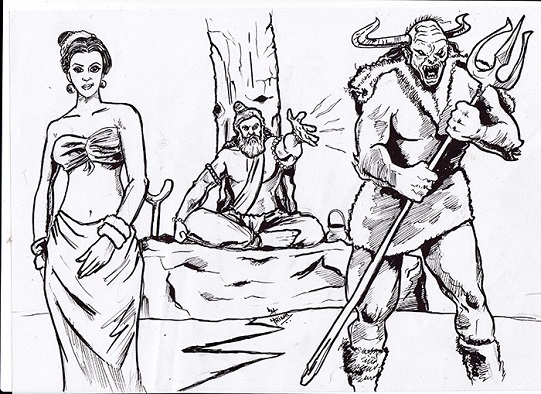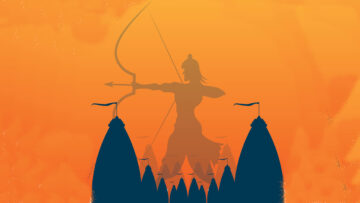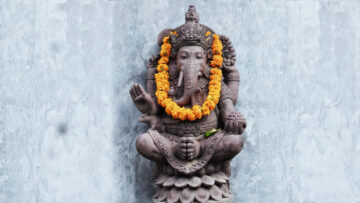The Vanaparva of Mahabharata is a treasure hive of stories. Sage Lomaharshana and Sage Markandeya narrate innumerable stories that help Pandavas develop a larger philosophical perspective, within which they could place their experiences and their education as princes. Yudhishthira, in his struggle to come to terms with his reality, asks many questions that become an opportunity for the rishis to bring forth experiences from the past through fascinating metaphors and narratives.
One such story that Lomaharshana (father of Sage Ugrashrava Souti who eventually narrates Mahabharata to the sages of Naimisharanya), narrates is the tragedy of Yavakreeta and Raibhya. The story dwells upon the importance of scholarship, worldly responsibilities, worldly ambition, naturally right paths of achievement, larger purpose than self and renunciation. Through different characters the story establishes the importance of each and their rightful place in our lives.
Sages must attain knowledge of Vedas and Shastras but in the most natural path. One should achieve one’s desires but without abdicating larger purposes of the world. Without a sense of renunciation, one is likely astray into dangerous paths. All of the being in the right proportion and in the right place is necessary – absence of one or in the wrong place leads to an imbalance resulting in wrong actions of tragic consequence.
Bharadvaja and Raibhya are two sages who are close friends. Raibhya has two sons Paravasu and Aravasu. Bharadvaja has one by name Yavakreeta. Raibhya is a great Vedic Scholar, and one adept in all the performances of a Vedic Brahmin. He is more successful, venerated by the Brahmin community and with great worldly ambition.
Apart from his scholarship, acquired through a proper study under a guru as laid out by the shastras, he is also a great tapasvi with special powers. He is much sought after by the world for Yajna and other Vedic performances. So are his sons – Paravasu and Aravasu.
Sage Bharadvaja on the other hand is a tapasvi with higher renunciation, always engaged in japa-tapa, completely oblivious to the world, and not bothered about earthly adulations. Yet they are close friends. Sage Bharadvaja is in no competition with Sage Raibhya.
Yavakreeta, though, is deeply unhappy with this reality – of less accolades to his father and his own self. He has all the ambition of Raibhya, but without the patience of attaining the same, through proper Vedic methods.
Bharadvaja on the other hand is so deep in his renunciation, that he is too late in identifying his son’s ambition. He completely misses setting Yavakreeta in his desired path to attain what he seeks, through the right methods.
At a certain stage, Yavakreeta’s ambition gets the better of his forced patience, and he seeks an immediate equality with Raibhya and his sons, and even beyond. He seeks to attain the knowledge of Vedas and Shastras at a high speed, rather than go through the grind of the study under a Guru. He retires to the forest, to force gods to reveal all knowledge to him at the earliest, through intense penance.
Apart from lacking patience, Yavakreeta also lacks an appreciation for the scholastic seeking and the inherent beauty in it, and considers it a mere grind. The end alone seems to be more important for Yavakreeta.
Lord Indra is deeply worried and appears in the form of a Brahmin to dissuade him from his unnatural path. Yavakreeta turns out to be stubborn, and rejects meaningful advice from Indra. He not only seeks the Vedic knowledge for himself and his father through his penance, but also for the entire Brahmins forever – if ever one were to do tapas.
Indra then tries to dissuade him in an indirect way. He appears in the form of a Brahmin and keeps pouring hands full of sand onto the river. Amused Yavakreeta wonders what he is upto. The Brahmin says if Yavakreeta could attain Vedic insight merely through tapas, why could he not build a bridge across Ganga through many handfuls of sand.
Yavakreeta recognizes this is none other than Indra. He sees the point to some extent that what he is seeking is a stretch and beyond the naturally achievable destination. But he cannot retire from his ambition in total. He then negotiates with Indra that at least he and his father should be graced with the insight, power of Vedas and Shastras.
Indra, at last, gives up. He has no other option but to reveal the knowledge that he desires. He graces that to Yavakreeta and Bharadavaja with a sense of worry for the future. Will this knowledge do good to Yavakreeta, will that stay with him?
An elated Yavakreeta returns to the ashrams at a great pace to share his achievement with Sage Bharadvaja. However, instead of rejoicing at this stupendous achievement of his son, Bharadvaja is disturbed, pained, and worried. Through his tapas and experience of life, if not through the newly revealed Vedic insight, he knows the pitfall of knowledge acquired through hasty means in unnatural ways.
It is more likely to cause imbalance, which could result in an undesired action, and eventual tragedy. Knowledge is not merely a destination. All true knowledge is substance, along with a container and with a set of instruments, to use it appropriately; and another set of instruments to ensure undesired use/spread of it.
Sage Bharadvaja is worried, that rather than sustaining the knowledge, it may result only in the growth of ahamkara, and eventual self-destruction. He knows that the very purpose of his acquiring the knowledge is a material equality with Raibhya and his sons; rather than a greater purpose either for himself, or for the world.
The purpose for which/with which we acquire knowledge is far more important than the knowledge itself. Knowledge for competition comes with its own risks. Yavakreeta though is immensely confident that he will not go astray, he will have none of his father’s advice.
Not very confident of his son’s assurance, he warns Yavakreeta never to go stray on a line with Raibhya, for he is too powerful and without a great control over his anger. He could simply destroy anything if it came to that. Yavakreeta provides that assurance with a lazy appreciation. But Bharadvaja’s worst fears come true – for he is a tapasvi with renunciation who can see far.
Soon Yavakreeta’s sense of entitlement grows beyond a point. He begins to make fun of Brahmins and sages. He knows he is a tapasvi who can curse people, and bring them to their worst fates onto their knees. However, his initial skirmishes are minor, but his inner ahamkara is slowly growing and about to cross a danger line.
Bharadvaja is too busy in his tapas. As it happens, once Yavakreeta is crossing Raibhya’s ashrama, and sees Paravasu’s beautiful wife. The men are not around in the ashrama. The worst crosses through his mind, and he gate-crashes Raibhya’s ashrama. He boldly seeks a union with Paravasu’s wife. Stunned by this violation, Paravasu’s wife realizes that she has a difficult choice ahead – of satisfying Yavakreeta against her wish, or being subjected to powers of Yavakreeta attained through his tapas.
She smartly weaves a plan, acts as though she is in agreement and confines him to a closet, and then reports the matter to Raibhya. In that moment, Raibhya gives into anger as Bharadvaja feared. He may have used his tapas to punish him without cruelty; but Raibhya scholarship and tapas are not tempered with a sense of renunciation yet.
Seething in anger, Raibhya creates a maiden beautiful in the mould of his daughter in law to seduce Yavakreeta, and another rakshasa to kill him. The maiden traps him, steals his kamandalu containing holy water and exposes him to the rakshasa.
Without his holy water, he is unable to kill the rakshasa through his powers of tapas. The rakshasa, through magic, creates an illusion of no water even in the lake and the River. Yavakreeta has to take shelter in his father’s yajnashala. But his ahamkara and accosting of an unwilling lady, have transformed his persona to such an extent that he is unrecognizable as the earlier tapasvi – Yavakreeta.
The blind gate-keeper of the yajnashaala of Bharadvaja fails to recognize him through his foot-steps, and does not allow him to enter. Our thoughts, our intentions determine our foot-steps. Completely caught outside all protection – both from his own achievements and that of his father – the rakshasa kills Yavakreeta effortlessly. He then lives with the maiden created by Sage Raibhya.
After his death, the gate-keeper realizes this was Yavakreeta. He is both pained and stunned that he could not recognize him. Soon, Bharadvaja is back but he is not welcomed by the Agni-s (Dakshinagni, Garhapatyagni, Ahavaniyagni) of the yajnashaala, as they always would. He wonders why.
The gate-keeper reveals all that has happened in his short absence. Even that great man of renunciation, Bharadvaja loses himself completely, and grieves for his son from his very depths. He remembers his warnings about the pitfalls of Yavakreeta’s ways, wonders why his warnings did not realize themselves as protection, and eventually turns to Raibhya’s cruel action.
He simply is not able to come to terms that Raibhya was oblivious that Yavakreeta was the only son of his friend, and he could have punished him differently without a cruel death. Coming down from all his renunciation, he curses Raibhya to attain a similar fate at the hands of his very son. He then jumps into the same pyre on which his son is set on fire.
The story now shifts to Raibhya. He is invited by the King to perform a mahayajna – assisted by Paravasu and Aravasu. One day, Paravasu on the way from the yajna from his duties in the night, mistakes his own father for a wild animal, and uses his powers to kill the animal, only to realize his personal loss, and the dual dosha of pitruhatya and brahmahatya.
Being a man of his word, he recovers, performs his father’s last rites, and returns to the yajna. He secretly asks his brother Aravasu to return to the ashrama, and perform all the necessary rites to relieve Paravasu of the dosha of brahmahatya, so that he could continue to perform the yajna for the King.
The good natured Aravasu with full knowledge of yajna, but a great mind of renunciation – agrees to take this responsibility, way beyond his age, without worrying about consequences. But he is trapped.
After performing rites to release his brother from the dosha, a returning Aravasu realizes his brother has no intention of welcoming him. Instead, Paravasu has accused Aravasu of killing his father, and the king banishes him.
Inflicted with immense pain, Aravasu then performs a deep penance seeking a release from the situation. Indra eventually appears, appreciates him for his conduct, and blesses Aravasu, bestowing him with great powers.
The King then realizes his mistake and makes him the head of the yajna. Indra grants boons to Aravasu, upon which he seeks that Yavakreeta, Bharadvaja, and Raibhya come back to life which is granted by Indra.
The story is an unusually long one in Mahabharata – among those narrated stories. At each step it contains many beautiful metaphors. Each of these sages strays into tragedies, as they ignore an aspect of Vedic life – in particular for a sage.
Raibhya is a great Vedic scholar, but without a sense of renunciation. He has knowledge, but not enough perspective of balance. Bharadvaja on the other hand is a man of renunciation, but without a worldly seeking. He forgets that he is a father.
This results in him not appreciating his son sufficiently as he grew up. Yavakreeta is immensely influenced by distant Raibhya. His father’s love and the tranquility he has attained in the path of renunciation, has not resulted in any perspective for Yavakreeta.
He seeks a destination, the status of Raibhya, without any love for the path. He seeks power in the fastest manner. He has no appreciation, that path is as important as the destination; unless the situation is exceptional. If he does not reach the destination in the right path, he will not be able to sustain the powers he has achieved. He may cause harm both to the world and to self.
All knowledge, even if it is Vedic, can only result in ahamkara if not acquired through right means. The shadripus (kama, krodha, lobha, moha, mada, and matsara) feed one into the other. Ahamkara leads to mada and hence to kama. Yavakreeta dares to violate Raibhya’s daughter-in-law, incurs Raibhya’s wrath, and meets a violent end.
His powers fail at a crucial moment, the nature of violation is such. You may be a Vedic scholar– but your intentions determine even the nature of your foot-steps, and one becomes unrecognizable; just like the blind gate-keeper, who fails to recognize Yavakreeta at a most crucial moment. Look at the introduction of a blind gate-keeper into the story at this stage.
Bharadvaja’s renunciation is a thorough failure as it has failed to shape his son in the right direction. The world can only be renounced after all worldly responsibilities are met. Bharadvaja has indirectly contributed to Yavakreeta’s straying. Worse, he loses his sense of balance, and indulges in a curse that is merely revenge, and brings an end to his own life, in a way much against his path of tapas, thus his path failing both his own self and his son.
On the other hand, Raibhya may be a great Vedic scholar but without enough renunciation, and without genuine larger purpose. When confronted with Yavakreeta’s violation, he loses a sense of proportion while handing out the retribution. He lets his anger and ego shape the curse, rather than a sense of balance.
Even as he is performing the yajna for the King, his greater purpose is the glory of the Paravasu, much in the mould of his father, is only concerned about being a worldly Brahmin. The end result of this path is depicted in Paravasu’s haste in killing his own father, and his deceit in shifting the blame to Aravasu, and framing him.
This is the tragedy of the mere worldly path chosen by Raibhya where Vedic Scholarship and tapas meant only power. At the same time, through Sage Aravasu it is depicted that an individual can overgrow the limitations of the environment. He alone comes out, as a person with the absolute balance of scholarship, knowledge, right path, and a mind of renunciation.
Even in his most painful state, in his eventual tapas he only seeks to release himself from an unjust situation, and seeks the lives of all those who have died premature deaths back. He does not lose a sense of proportion, and displays a perfect balance that a true Sage should possess.
This fascinating short story in Mahabharata contains so much in a mere number of verses. It has packed an entire perspective into a simple story of few characters – so very characteristic of our classical epics.
Disclaimer: The opinions expressed in this article belong to the author. Indic Today is neither responsible nor liable for the accuracy, completeness, suitability, or validity of any information in the article.










